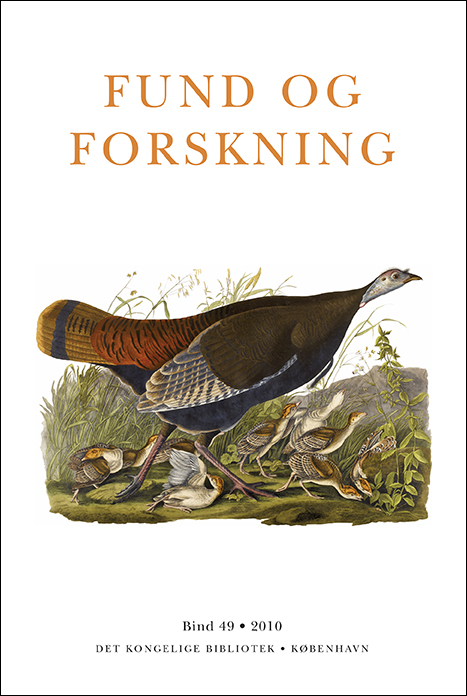“Jyske Lov” som krigsbytte. En mytes opståen, udnyttelse og fald
DOI:
https://doi.org/10.7146/fof.v49i0.41240Abstract
NB: Artiklen er på dansk, kun resuméet er på engelsk.In 1996, the newly-founded national conservative Dansk Folkeparti [Danish People’s Party] proposed in Parliament, for the first time, that the Danish state and government should demand that Sweden returns the spoils of war taken during the Dano-Swedish Wars in the 1600s. The demand has since been repeated six times in the Danish Parliament and at the Nordic Council in the last nearly 15 years. The demand included return of the Jyske Lov manuscript from 1241. The background was the notion that Sweden possessed what was called the “original edition”. This was the origin of the myth that the Swedes were in fact unaware that it was in their possession, and this was reinforced, in its moral expression of the demand for return, by the view that the manuscript constituted spoils of war from 1658-1659. The author of this thesis is of the opinion that the Dansk Folkeparti apparently had become aware of one of the most important recent discoveries in the history of the Danish Middle Ages, that is, historian Thomas Riis’ re-dating in 1977 (in his dissertation, Les institutions politiques centrales du Danemark 1100-1332. Odense, 1977.), of the oldest parts of the Codex holmiensis 37 (C 37) manuscript in the Kungliga Biblioteket, Sweden’s national library in Stockholm. This manuscript contains a transcript of Jyske Lov and had previously been thought to date from approximately 1350 but can now with certainty be dated to around 1276. It was also clear that the Dansk Folkeparti had misunderstood various aspects of the research results, leading it to put together its own particular version of the myth and, in doing so, politicised the results of historical research into the Danish Middle Ages to a degree never seen in recent times. At one point, the author of this thesis began to suspect that C 37 could not be spoils of war and therefore began a scholarly study of the issue that, in 2004, showed that, in fact, C 37 could not be spoils of war. The objective with this thesis has therefore been to trace the provenance of this myth and its political exploitation and to show the consequences of falsification of the spoils-of-war thesis, given the fact that research having shown that C 37 was not spoils of war but either purchased or bequeathed to the Kungliga Biblioteket in the 1720s, which made it possible, at the express political wish of the Danish government in 2009, for the author, as National Librarian and Head of the Royal Library, to undertake negotiations with Sweden on a voluntary, reciprocal, non-prejudicial exchange of C 37 with a corresponding Swedish law manuscript containing Swedish provincial law, Södermannalagen, New Royal Collection 2237, n. 4, that presumably arrived in Denmark in the second half of the 1700s. The thesis deals with the demonstration by recent research that Jyske Lov, proclaimed by King Valdemar the Conqueror in Vordingborg in March 1241, was considered as the first Danish national law (that it became “limited” to regional law for Jutland-Funen is a development from the end of the 14th or the beginning of the 15th century), with its survival and the re-dating of C 37 in 1977 (which thereby became the oldest extant manuscript containing a surviving version of the law, the contents of which are at least 25 and perhaps up to 50 years older than the later surviving version, which had previously been considered as the oldest). The thesis then traces the spoils-of-war notion in professional circles (it dates back to at least to 1976 in the non-professional context), considered to have appeared in 1991, its introduction to politics in 1996 and six subsequent questions raised in the Danish Parliament and at the Nordic Council up to 2009. Finally, the case is carried through to June 2010, when a draft exchange agreement was drawn up between the two Royal Libraries.Downloads
Published
2014-06-11
How to Cite
Nielsen, E. K. (2014). “Jyske Lov” som krigsbytte. En mytes opståen, udnyttelse og fald. Fund Og Forskning, 49, 437. https://doi.org/10.7146/fof.v49i0.41240
Issue
Section
Articles


